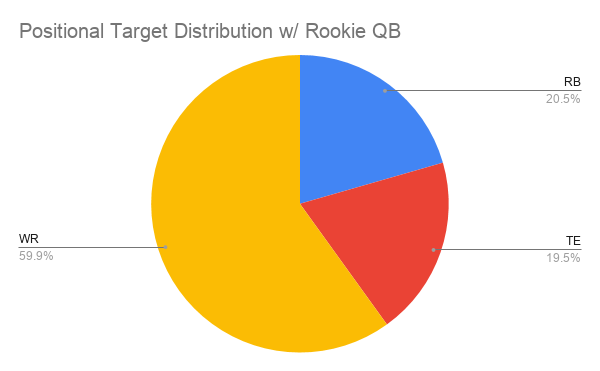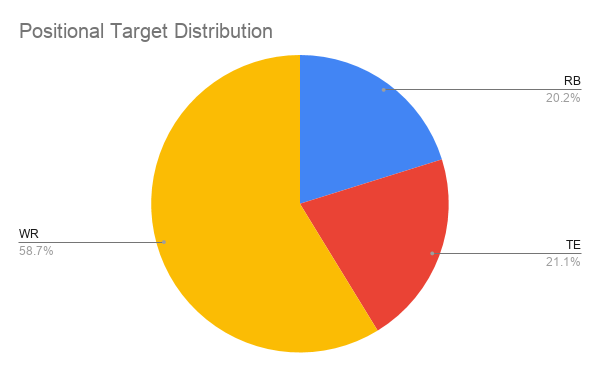Draft Strategies | Depth Charts | Mock Drafts | SOS | Tools | ADP
Diehards Staff Experts Poll | Draft Simulator | University Videos
Do Rookie Quarterbacks Have Predictable Tendencies

Most times, when a rookie quarterback enters the league, pundits will claim that the young passer will lean on a specific target, the tight end position, or any number of random archetypes. Daniel Jones was expected to lean on Saquon Barkley but the latter was injured for most of the season. Kyler Murray had Larry Fitzgerald as an outlet via the slot...except Christian Kirk commanded a higher target share. Lamar Jackson would get a safety net at the tight end position and he did. That player just wasn’t the Ravens’ first-round tight end Hayden Hurst. His name was Mark Andrews. Picking apart these arguments or supporting them with anecdotes is easy but there can be a truth found within data. I looked at all of the rookie quarterbacks who started at least five games over the past three seasons and broke down their target distributions across their starts. Here’s what I found.
There's No Difference!


There was almost no measurable difference in how rookie passers distributed the ball versus all quarterbacks from 2019. The difference that was present was incredibly minuscule. The difference has been the wide receivers seeing a 1.2% increase in their target share while tight ends pay most of that with a 1.6% drop in target share. This is likely the result of randomness and that’s evident in which teams haven’t started a rookie passer in the past three years. The target vacuums at the tight end positions have been Rob Gronkowski, Zach Ertz, Travis Kelce, and George Kittle. Ertz caught balls from a rookie passer four seasons ago. Patrick Mahomes started a single game in his rookie season. George Kittle almost recorded some games with rookie Nick Mullens under center in 2018 but it was technically Mullen’s second season as he spent the first on San Francisco’s practice squad.
The marginal differences between rookie passers and their veteran counterparts are not actionable and likely due to randomness anyways.
What about…?
Another narrative commonly pushed onto fantasy players is that first-year passers are more likely to lock onto one target. Based on the above data, they could still be potentially funneling targets to a specific player, that player simply isn’t predicted by the position they play. However, this was wholly untrue as well.
The target-leader during each rookie passer’s tenure averaged a 22.5% target share. Last year, the 32 target leaders by team across the NFL posted a mean target share of 23.3%. Passers in their first campaign were actually less likely to lock onto a single option but, again, this is a close enough gap that the difference is nothing more than noise.
A Potential Difference
The one slight difference that may be more than just randomness was the average depth of target of rookie passers. The incoming quarterbacks posted an aDOT of 9.1 compared to the aDOT across the league last season of 8.4. Deeper targets are far more valuable and the NFL has had a recent influx of gunslinger types including Daniel Jones, Josh Allen, Baker Mayfield. The difference in aDOT isn’t enough to make sweeping changes to how we value players with rookie quarterbacks under center as an aDOT change of .7 isn’t going to impact fantasy in any meaningful way. It does give us something to monitor going forward to see if the gulf widens. If the NFL’s youth continues to skew deep-ball heavy, then it may be worth looking to the burners with rookie passers. Until there is a larger gap, fade the narratives and don’t shuffle around projected targets just because a team acquired a younger passer. The only difference between a quarterback playing in his first game and one starting his 100th is the former will likely be younger unless they’re Brandon Weeden. In the first week of the 2012 season, there were 32 starting quarterbacks, obviously. Starting in his first career game, Browns ROOKIE QUARTERBACK Brandon Weeden was 28.3 years old, making him the 14th-oldest passer to start that week.
2020 Takeaways
Simply put, forget whatever anyone says about Joe Burrow leaning on Tyler Boyd out of the slot or a Chargers’ QB pumping targets to Hunter Henry. These narratives seem to focus on low aDOT players and not only is that not backed up by data, but the data may support the opposite. Joe Burrow can drop dimes anywhere on the field and devaluing a Cincinnati receiver isn’t going to be devalued based exclusively on the fact that he is a rookie. He’s likely to turn his offense around and all players can be projected to profit from this equally. Buy good rookie quarterbacks and their weapons like Joe Burrow and sell the narratives that would have you fade one of his options.
